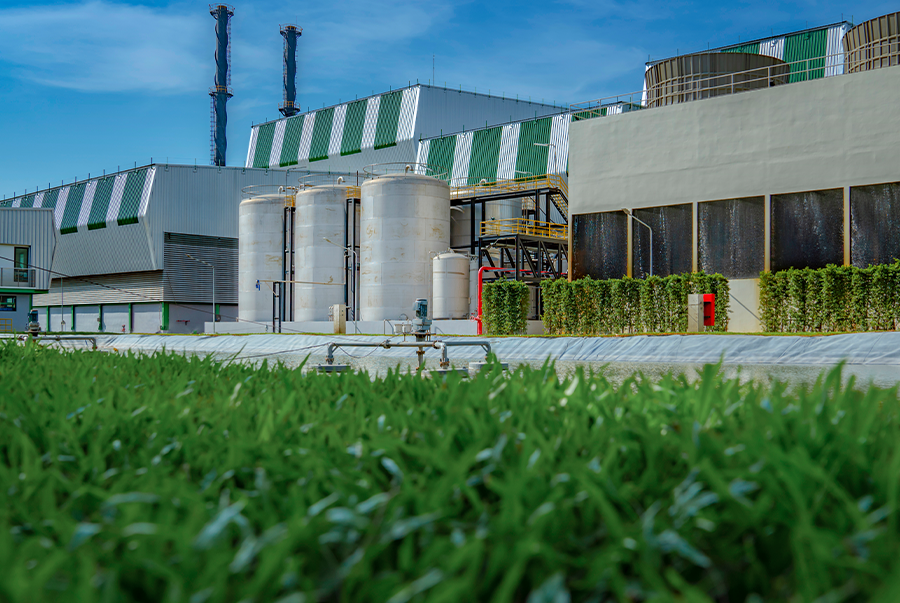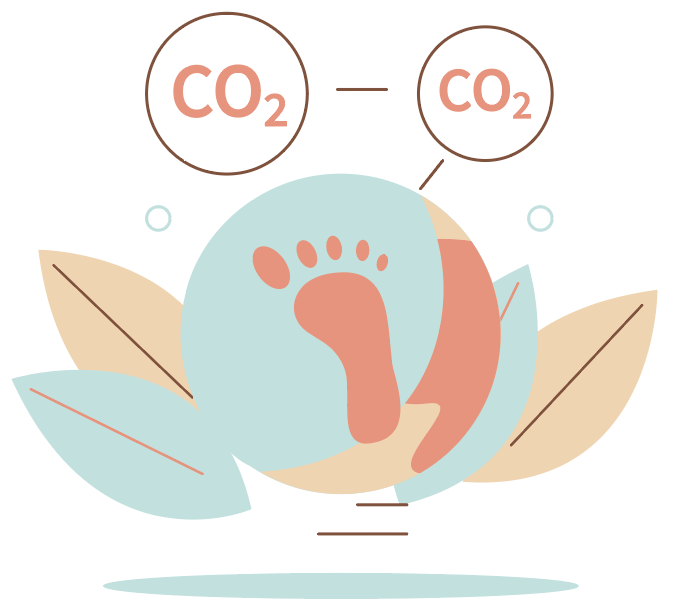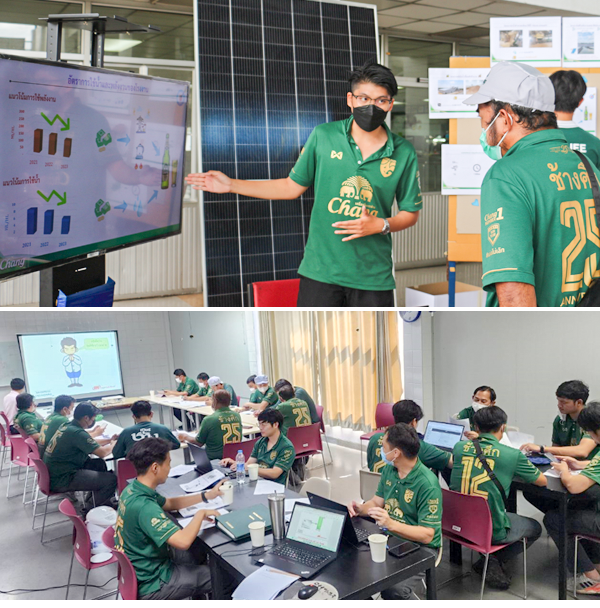ThaiBev’s sustainability strategy has well-defined
environmental, social, and governance (ESG) initiatives and goals, including a clear target to achieve net-zero GHG emissions for Scope 1 & 2 by 2040.
The strategy will enable ThaiBev to drive sustainable development and resilience across its business, protect
the environment, support local communities, and enhance governance. The company’s commitment to the “Enabling Sustainable Growth” strategy sets out quantifiable targets
to help it achieve sustainability and net-zero emissions.
ThaiBev is committed to raising the proportion of renewable energy usage by increasing investment in innovative low-carbon technologies and solutions that contribute to climate change mitigation and adaptation efforts, as well as promoting optimization of overall resource use for maximum efficiency. This approach extends to raising awareness among stakeholders about climate change initiatives.
ThaiBev has integrated climate-change risks and
opportunities into its strategy and operations to drive continued improvement and to enhance its resilience to climate change, while also enhancing value creation for the business and connected communities. The company uses this strategy to disclose climate-related financial risks and opportunities in line with the Task Force on Climate-related Financial Disclosure (TCFD) recommendations to ensure transparency with stakeholders and to align with global
best practices.
In alignment to attain net-zero GHG emissions, ThaiBev has completed its Science-Based Targets Initiative's (SBTi) submission in July 2024. ThaiBev SBTi-aligned targets include 42% reduction for direct (scope 1) and indirect (scope 2) emissions by the year 2030. ThaiBev also set the target to reduce 25% of non-FLAG indirect (scope 3) emissions by the year 2030, covering 71.67% of total scope 3 emissions in 2023 base year. And Net-Zero GHG emissions target for Scope 1, 2, and 3 by 2050.
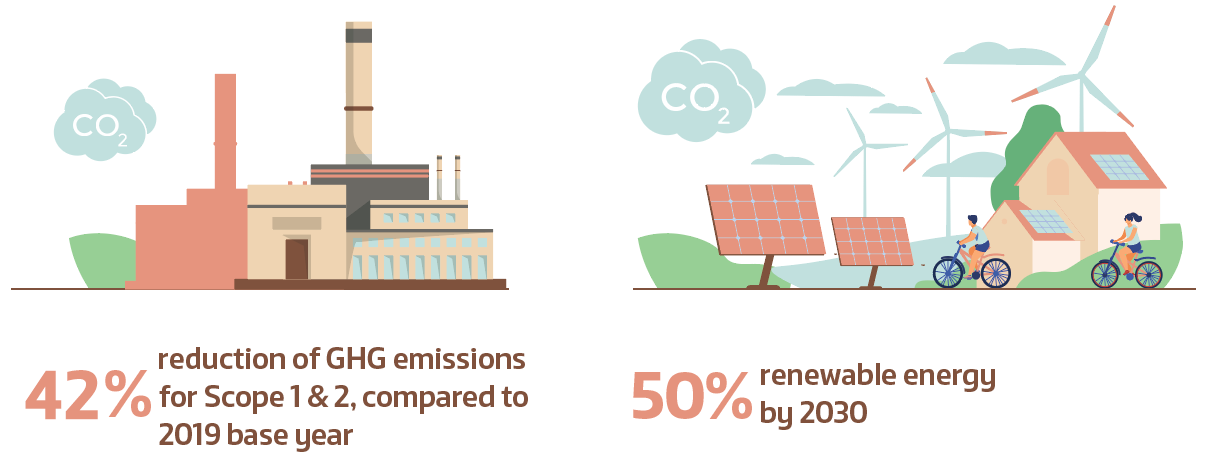
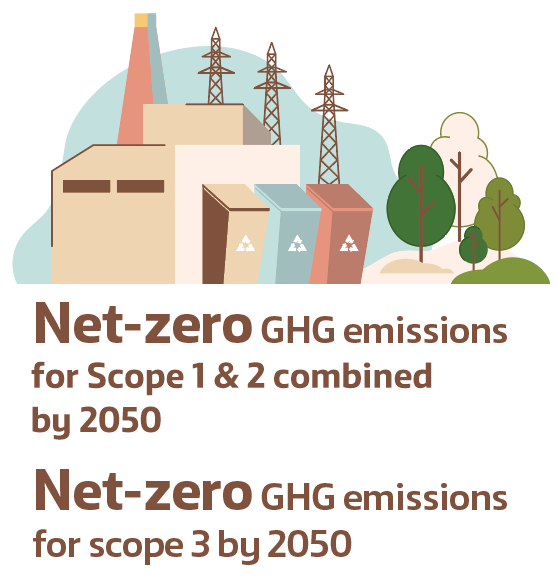
Renewable energy projects contribute significantly to
global efforts to reduce reliance on fossil fuels, decrease greenhouse gas emissions, and build a more sustainable energy future. These initiatives are instrumental in achieving renewable energy targets, promoting environmental sustainability, and fostering innovation in the energy sector.
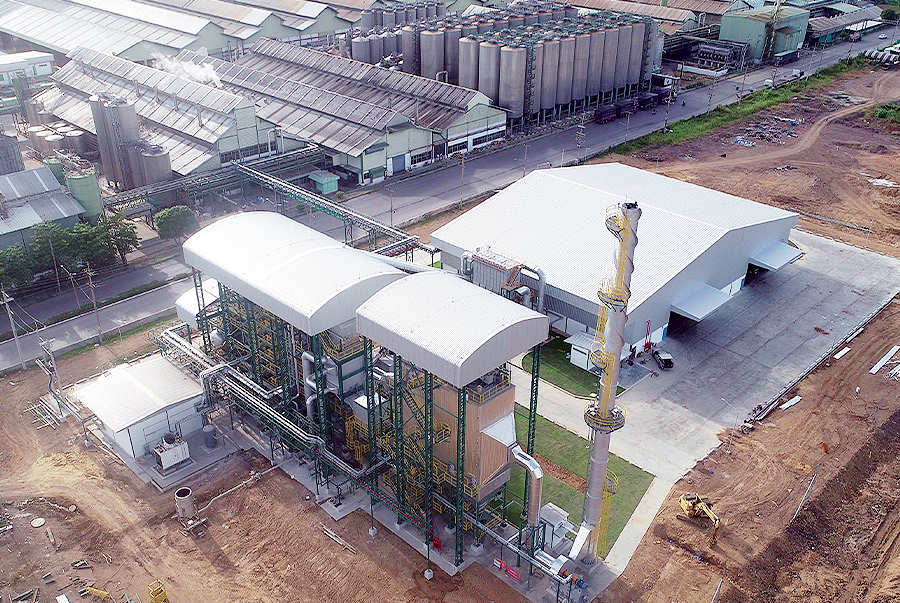
In 2023, ThaiBev installed a 30-tonne biomass boiler in
Phra Nakhon Si Ayutthaya Province with an investment of 160 million Baht.
It uses organic materials such as wood chip, wood pellet, and palm shell and is also designed to be able
to use waste labels, sludge from wastewater treatment,
and tea-leaf residue for steams generation, replacing fossil-fuel energy.
These biomass boiler produces 273,000 Megajoules (MJ) of
thermal energy, leading to a reduction in heavy oil and coal consumption for steam production by 1.8 million liters and
18 million kilograms, with a GHG emissions reduction of
48,632 tCO
2e per year and an energy cost reduction of about
93 million Baht per year. In addition, this biomass plant can reduce waste to landfills by about 6,000 metric tonnes per year.
Meanwhile, the distillery in Myanmar uses a biomass boiler to produce steam for operations, using rice-husk pellets and wood chips as the energy source.
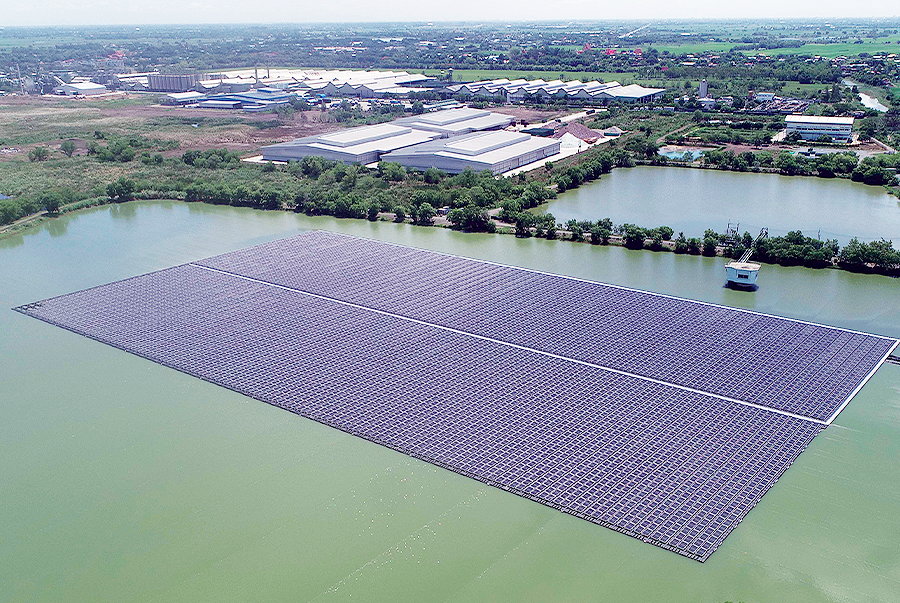
The solar system project’s phases 1–3 cover the installation of solar rooftops and floating solar panels at the spirits factories, breweries, non-alcoholic beverage factories, and food factory in Thailand, Myanmar, and Vietnam. Total installation in 40 factories has been completed with a total capacity of 42.48 MWp.
The installed solar panels can generate 29,383 Megawatt hours (MWh), which reduces the cost of electricity purchased from the Provincial Electricity Authority (PEA) by 123.41 million Baht per year and lowered GHG emissions by 13,799 tCO
2e in FY2023.
In 2023, ThaiBev started Phase 4 to expand solar panel installation to cover all business groups in Thailand, with
solar rooftops and floating solar panels to be installed at the breweries and non-alcoholic beverage factories. The goal is to produce 14.05 MWp, equivalent to an annual saving of
107.3 million Baht, and reduce GHG emissions by up to
9,801 tCO
2e per year.
The total investment in this project is approximately 394.43 million Baht and it is expected to be completed in FY2024 . Vietnam is aiming to expand the solar rooftop project further to cover all of its operations.
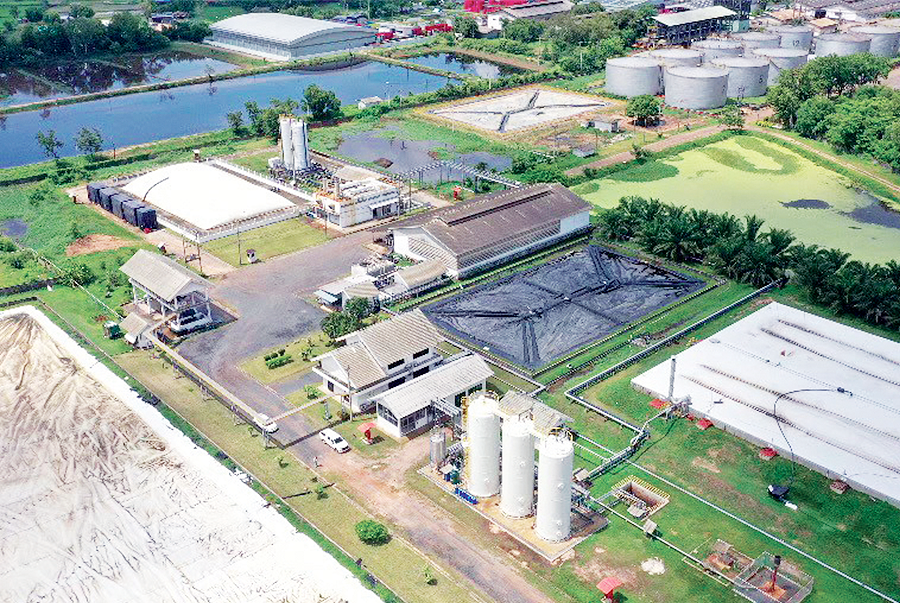
ThaiBev has seven existing biogas plants that use by-
products from alcohol distillation, known as vinasse,
as input to produce biogas for steam generation and to replace fossil-fuel energy. These biogas plants produce 517,250,951 Megajoules (MJ) of thermal energy, leading to
a reduction in consumption of fuel oil by 12.8 million liters, equivalent to an annual cost saving of 220 million Baht. These biogas plants have also successfully reduced annual GHG emissions by 11,891 tCO
2e. In addition, excess biogas from the steam production process can be used to generate electricity at 37,219 Megawatt hours (MWh) to be sold to local grids.
In 2023, the company is installing a biogas plant at the distillery in Ratchaburi Province with an investment of 187 million Baht. This project will be able to reduce heavy fuel oil consumption for steam production by 1.5 million liters
per year, with a GHG emissions reduction of 20,205 tCO
2e
per year. This project is anticipated to be completed in 2024.
In Thailand and Vietnam, all ThaiBev’s breweries have adopted CO
2 recovery practices in their operations.
This involves capturing the carbon dioxide (CO
2) generated from the fermentation process in the production of alcoholic beverages. The recovered CO
2 is then used for the brewing process and carbonating beverages, such as soda and beer, thus contributing to both sustainability and operational efficiency.
These projects reduce energy costs by about 268.33 million Baht per year and lowered GHG emissions by 53,667 tCO
2e
in FY2023.
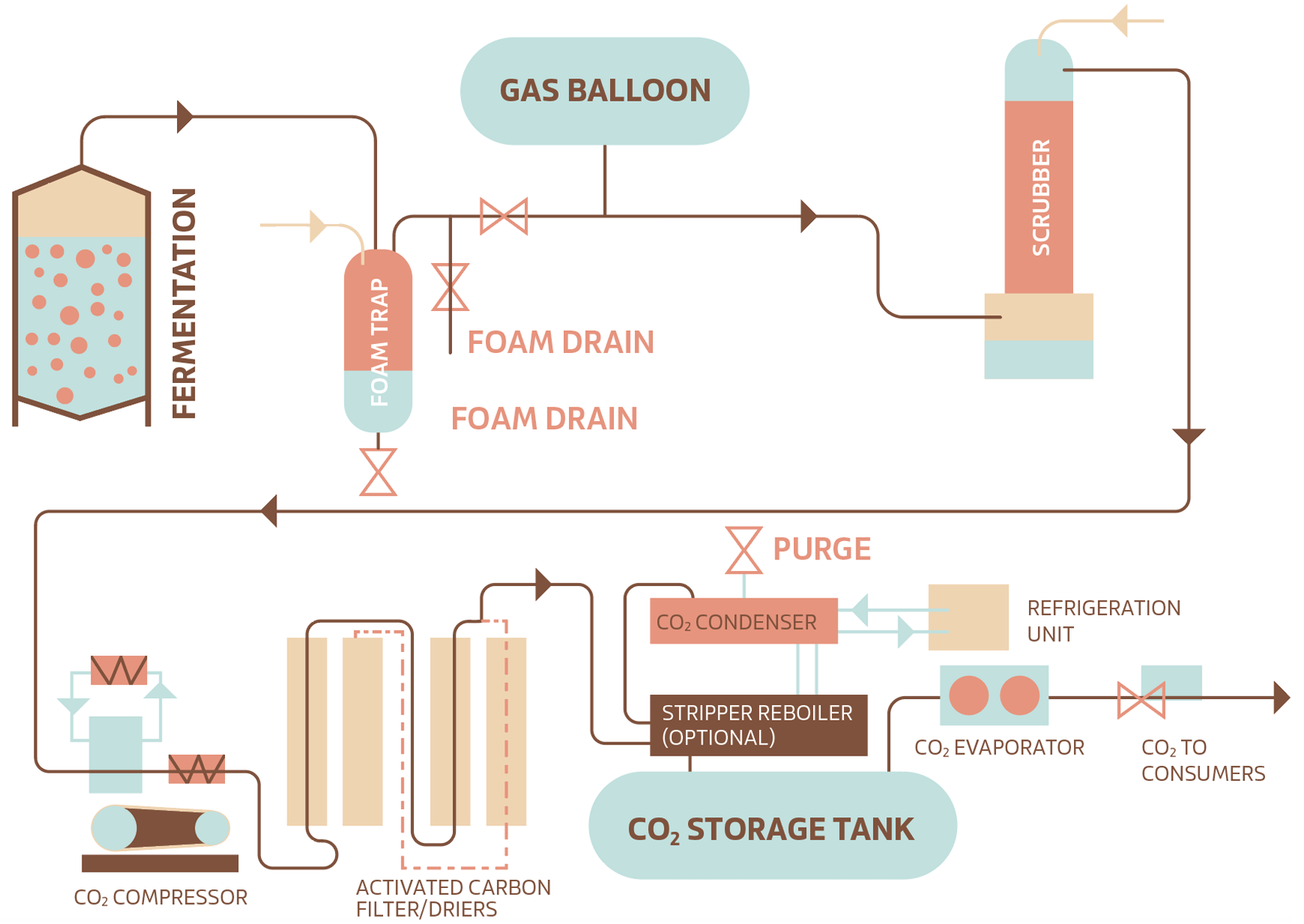
ThaiBev continues to register products with the Thailand Greenhouse Gas Management Organization (TGO) in the
Carbon Footprint Reduction (CFR) Project, to demonstrate reduction of a product’s carbon footprint by 2% or more when compared to the base year – as required by the TGO’s Carbon Labelling Program.
The CFR project enables consumers to contribute towards avoiding carbon emissions by purchasing low-carbon products.
53
Number of products with Carbon Footprint Reduction (CFR) certification
91
Number of products with Carbon Footprint Product (CFP) certification
9.4%
Revenue from low-carbon products
(% of total revenue)
Remark: Excludes operations in Vietnam
ThaiBev conducts energy audits in each business unit to assess and improve energy efficiency in their production processes. This includes exploring ways to reduce energy use through innovative technology or alternative energy sources. Each business unit has an energy management working group to evaluate energy use and seek ways to reduce greenhouse gas emissions. They report their energy use to Department of Alternative Energy Development and Efficiencyม he Ministry of Energy and voluntarily participate in assessments for compliance with the ISO 50001 standard, which includes energy management certification from third parties. In 2023, 13 factories within ThaiBev received ISO 50001 certification.
Following the energy audit, our team of engineers and scientists from various departments evaluated improvement opportunities and operational controls. They researched and developed processes and technologies for energy-using systems and production, considering both renewable and alternative energy sources within and outside the organization throughout the value chain.
ThaiBev uses innovation to evolve production processes to gain a competitive advantage and improve the quality of the working environment for employees. Innovation is also leveraged to reduce impacts on the environment and society. In 2023, we expended 920 million baht on energy-saving and renewable projects. These projects include expenditures aimed at reducing greenhouse gas emissions.
- Renewable Energy Projects: Solar panels, biogas, and biomass projects significantly contribute to reducing reliance on fossil fuels and decreasing greenhouse gas emissions.
- GHG Emissions Reduction Projects: CO2 recovery projects capture carbon dioxide generated from the fermentation process in the production of alcoholic beverages, which is then used for the brewing process and carbonating beverages.
- Energy Efficiency Projects: Initiatives to maximize energy efficiency, such as installing high-efficiency motor systems, replacing old air compressors with new ones, and reducing process losses.
Furthermore, ThaiBev is committed to setting and achieving ambitious energy efficiency targets to drive sustainable growth and reduce environmental impact through improving energy efficiency and reducing energy consumption.
ThaiBev places a strong emphasis on energy training for its employees to ensure the effective implementation of energy efficiency measures and the successful adoption of new technologies. This approach aims to raise awareness about the importance of energy conservation and the role each employee plays in achieving the company's energy efficiency goals.
We provide knowledge to employees by inviting experts to conduct training sessions and through organizing campaign activities. These initiatives aim to educate employees about ongoing projects within the organization and foster their participation in environmental care.
This comprehensive approach ensures that all employees are engaged in the company's energy-saving initiatives and are equipped to contribute effectively to ThaiBev's sustainability goals.
To reach maximum energy efficiency, ThaiBev continually invests in innovative projects and new technology development.
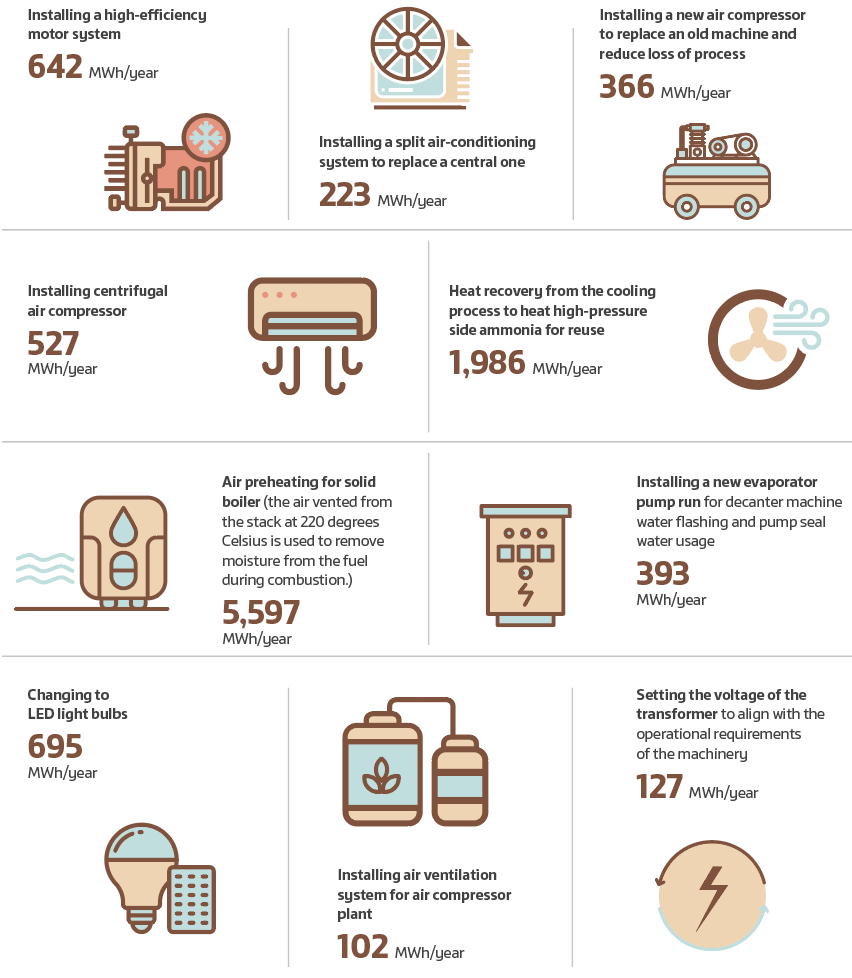
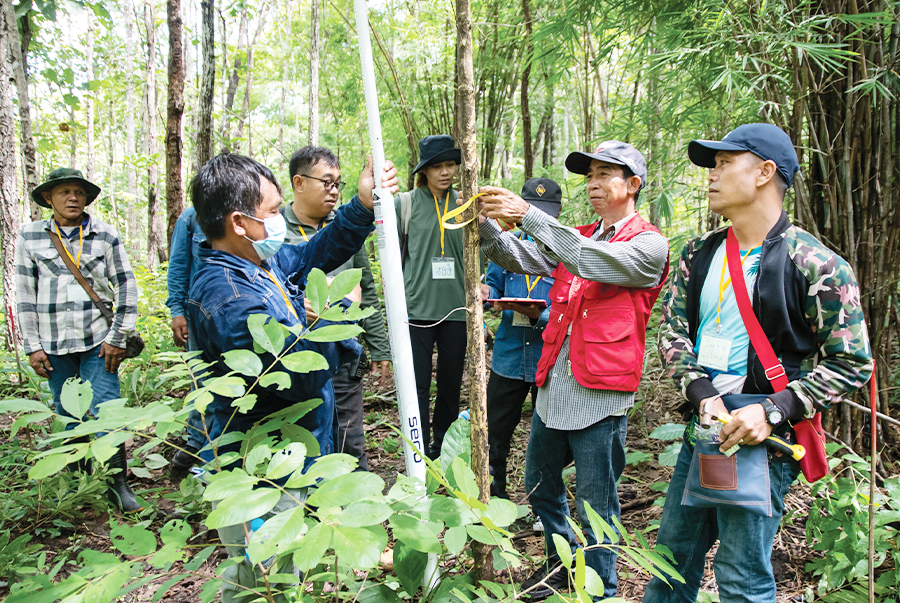
ThaiBev has joined the Mae Fah Luang Foundation’s Community Forest Project. The foundation is seeking to expand community forests through the forest carbon-credit management mechanism for sustainable development, which aims to integrate rural development with forest preservation to reduce Thailand’s greenhouse gas emissions.In 2024, Phase 3 of the project will add a total area of
32,950 rai (5,272 hectares).
The carbon credit will be registered under ThaiBev’s account as part of the Thailand Voluntary Emission Reduction (T-VER) Project, and can be used to offset the company’s own GHG emissions or donated to offset the emissions created. This project will take ten years to complete. avoid CAPEX investment decisions in high-emission projects. ThaiBev’s implementation strategy is to use the ICP of USD 20/tCO
2e for investment of more than 10 million Baht per project during 2020–2024, and USD 32/tCO
2e for project investment of more than 5 million Baht during 2025–2030.
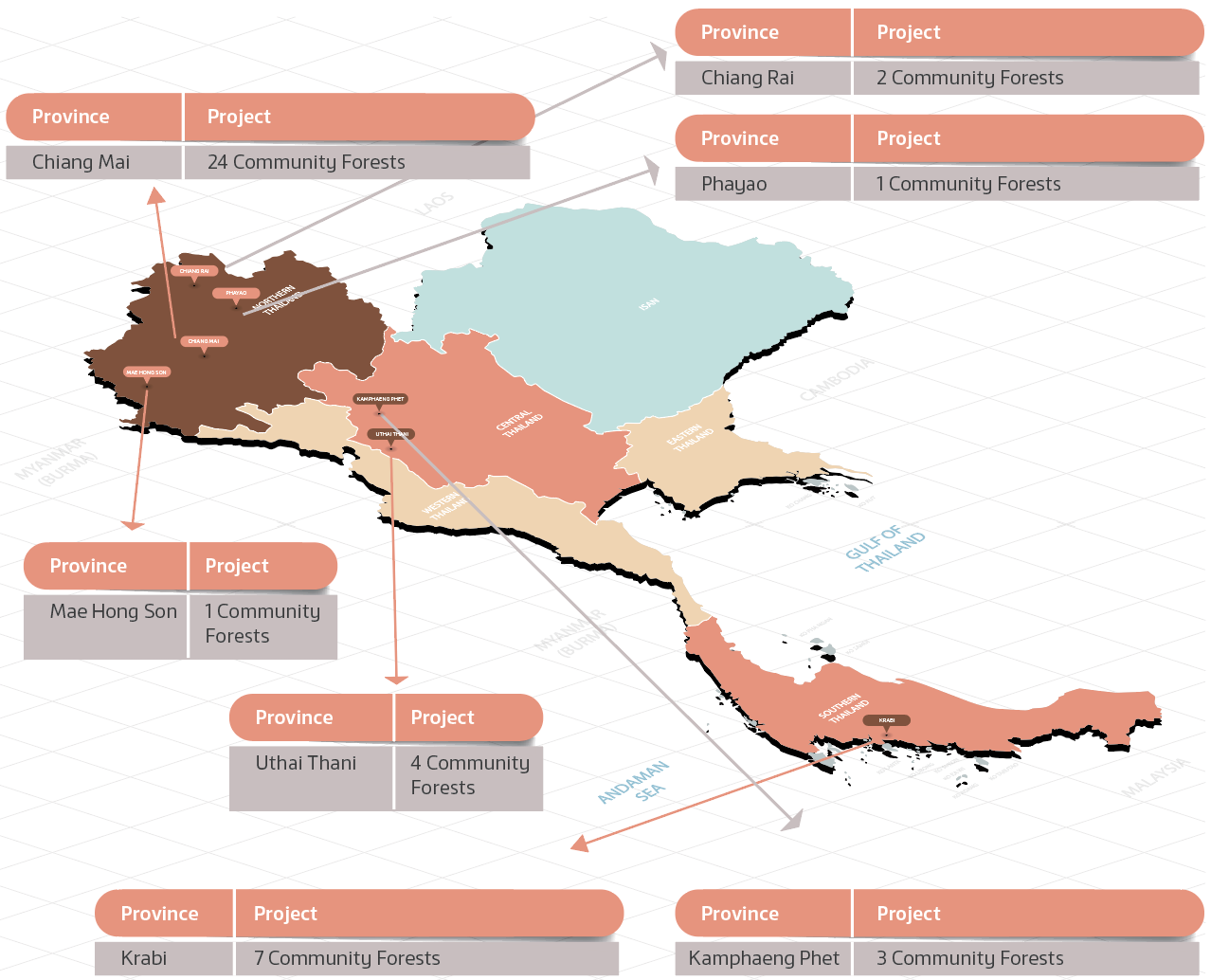
Total area of
13,636 rai
(2,182 hectares)
Total area of
32,505 rai
(5,201 hectares)
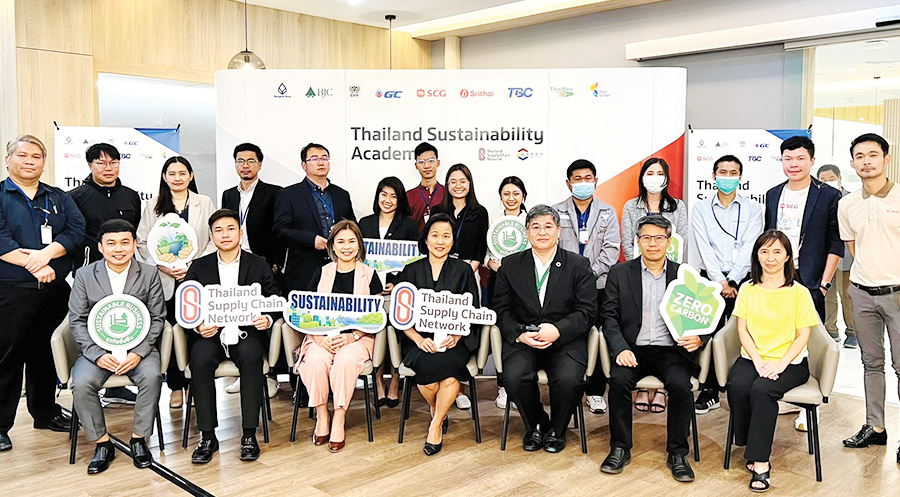
ThaiBev collaborates with strategic business partners to enhance supplier development through the Thailand Supply
Chain Network (TSCN), by sharing know-how in sustainable development practices via invitations to attend training/seminar sessions held by the Thailand Sustainability Academy (TSA).
In 2023, the TSA successfully organized the first training classes on the topic of “The Power of One: Taking Action to Reduce GHG Emissions” for Scope 1 and Scope 2, at C asean, Queen Sirikit National Convention Center. We were very honored to have guest speakers from the TSCN founding companies, such as The Siam Cement Public Company
The carbon credit will be registered under ThaiBev’s account as part of the Thailand Voluntary Emission Reduction (T-VER) Project, and can be used to offset the company’s own GHG emissions or donated to offset the emissions created. This project will take ten years to complete.
To accelerate the reduction of our own emissions and drive low-carbon investment within the company, ThaiBev uses ICP (Internal Carbon Pricing) to understand the value of the company’s full carbon footprint relative to overall operation costs, profit margins, and company turnover; and to calculate the potential impacts of carbon emissions on our business and activities, including risks and opportunities to build resilience against climate change and investing in low-carbon technology. ThaiBev will apply ICP as shadow pricing to support CAPEX investment decisions in green projects.
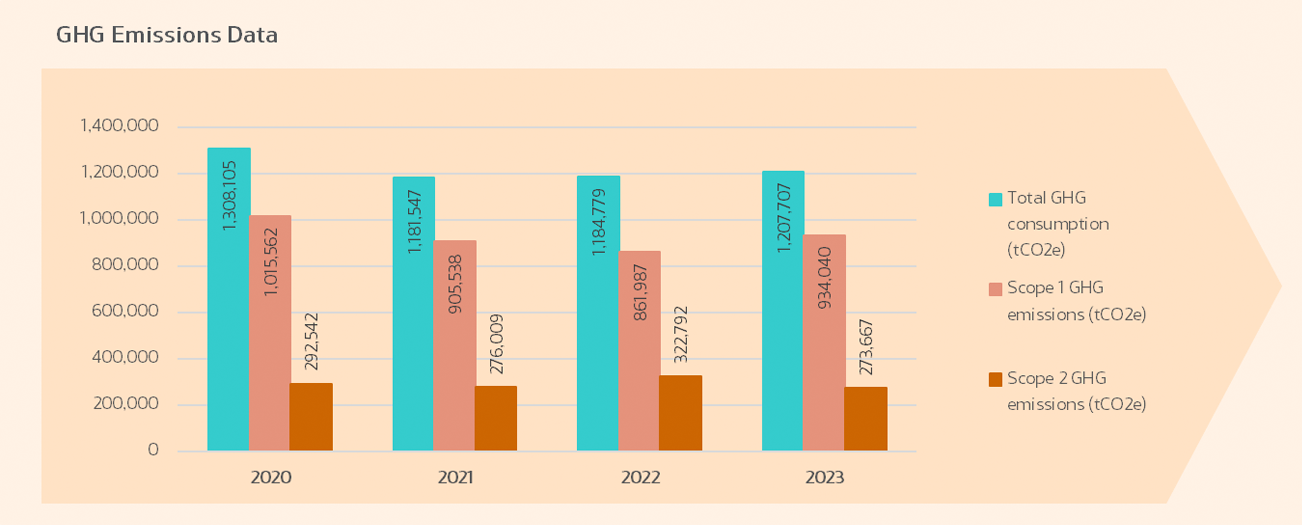

22.35
kgCO
2e/hL
Beverage business in 2023*

1.28
kgCO
2e/kg
Food business in 2023
Remarks:
Excludes operations in Vietnam
* GHG Emissions Intensity of beverage business including Vietnam in FY 2023 is 36.07 kgCO2e /hL
| Metric tons CO2e |
1,967,825 |
3,339,055 |
| Purchased goods and services |
Metric tons CO2e |
1,414,103 |
2,785,334 |
Hybrid method, including:
- Supplier-specific method
- Average-data method
- Spend-based method
|
| Capital goods |
Metric tons CO2e |
32,258 |
32,258 |
Spend-based method |
| Fuel- and energy- related activities |
Metric tons CO2e |
127,493 |
127,493 |
Average-data method |
| Upstream transportation and distribution |
Metric tons CO2e |
165,860 |
165,860 |
Distance-based method |
| Waste generated in operations |
Metric tons CO2e |
11,137 |
11,137 |
Waste-type-specific method |
| Business travel |
Metric tons CO2e |
1,138 |
1,138 |
- Distance-based method
- Spend-based method
|
| Employee commuting |
Metric tons CO2e |
435 |
435 |
Distance-based method |
| Upstream leased assets |
Metric tons CO2e |
N/A |
N/A |
Activity not relevant to ThaiBev |
| Downstream transportation and distribution |
Metric tons CO2e |
91,560 |
91,560 |
Average-data method |
| Processing of sold products |
Metric tons CO2e |
N/A |
N/A |
Activity not relevant to ThaiBev |
| Use of sold products |
Metric tons CO2e |
285 |
285 |
Direct Use-Phase Emissions: Greenhouse gases and products that contain or form green house gases that are emitted during use |
| End of life treatment of sold products |
Metric tons CO2e |
4,379 |
4,379 |
Activity data, packaging materials |
| Downstream leased assets |
Metric tons CO2e |
N/A |
N/A |
Activity not relevant to ThaiBev |
| Franchises |
Metric tons CO2e |
N/A |
N/A |
Activity not relevant to ThaiBev |
| Investments |
Metric tons CO2e |
119,176 |
119,176 |
- Investment-specific method
- Average-data method
|
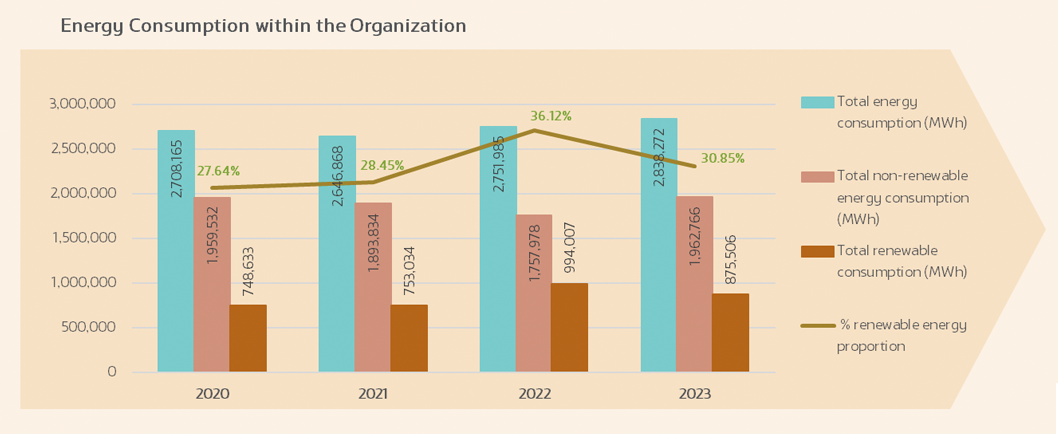

31%
Proportion of renewable energy within the organization

188.62
MJ/hL
Beverage business in 2023
|

11.63
MJ/hL
Food business in 2023
|
Remarks:
- Excludes operations in Vietnam
- * Energy Intensity of beverage business including Vietnam in FY 2023 is 189.40 MJ/hL
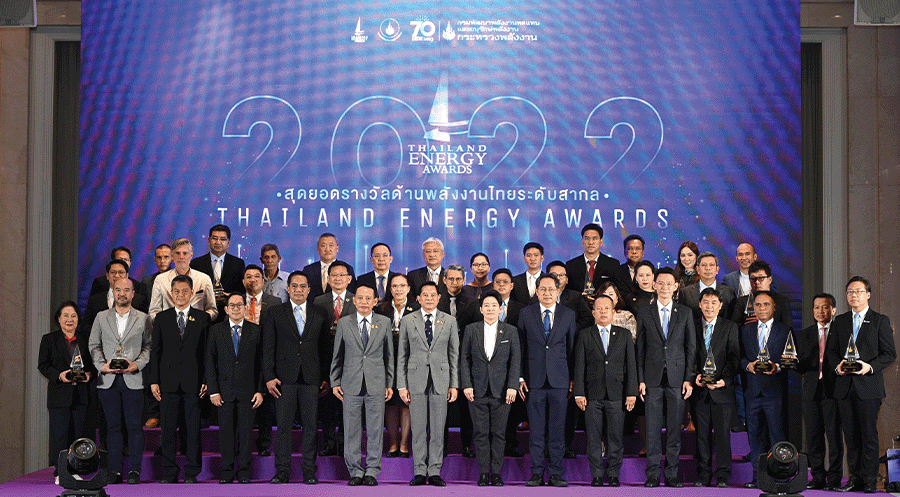
Presented by the Ministry of Energy, the Thailand Energy Awards are given to organizations driving the development of renewable energy and energy conservation in Thailand, with the motto of “Stably and continuously create
outstanding work with tangible results, leading Thailand
to become a leader in sustainable energy in ASEAN”.
In 2023, ThaiBev received the following awards:
- Excellence Award – Renewable Energy Awards, Off-Grid Alternative Energy Project (Thermal): renewable energy production project from distillery slop by Thai Beverage Energy Company (Nong Khai Province)
- Excellence Award – Renewable Energy Awards, Off-Grid Alternative Energy Project (Thermal): renewable energy production project from distillery slop by Thai Beverage Energy Company (Nakhon Sawan Province)
- Excellence Award – Energy personnel Award, Energy Management Team for Designated Factory of Cosmos Brewery (Thailand) Company Limited
